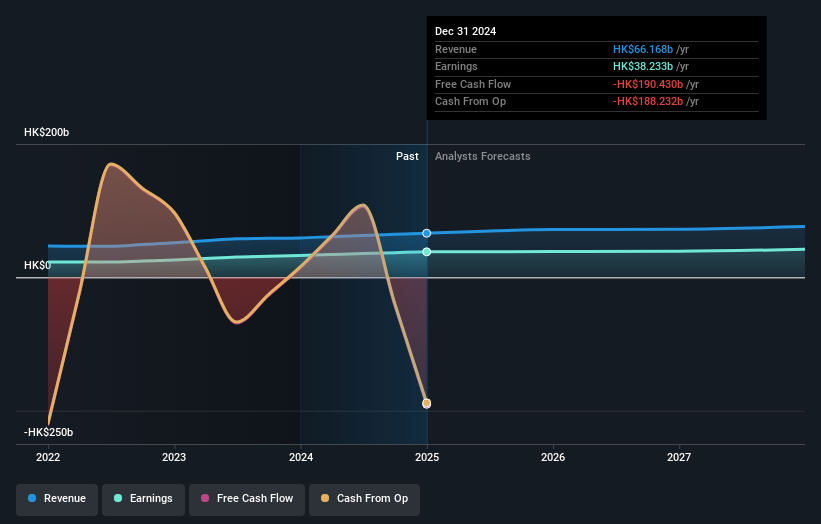BOC Hong Kong (Holdings) Limited (HKG:2388) stock most popular amongst public companies who own 66%, while individual investors hold 25%

Key Insights
- Significant control over BOC Hong Kong (Holdings) by public companies implies that the general public has more power to influence management and governance-related decisions
- 66% of the company is held by a single shareholder (Bank of China Limited)
- Analyst forecasts along with ownership data serve to give a strong idea about prospects for a business
If you want to know who really controls BOC Hong Kong (Holdings) Limited (HKG:2388), then you'll have to look at the makeup of its share registry. With 66% stake, public companies possess the maximum shares in the company. Put another way, the group faces the maximum upside potential (or downside risk).
Meanwhile, individual investors make up 25% of the company’s shareholders.
Let's delve deeper into each type of owner of BOC Hong Kong (Holdings), beginning with the chart below.
See our latest analysis for BOC Hong Kong (Holdings)

What Does The Institutional Ownership Tell Us About BOC Hong Kong (Holdings)?
Institutional investors commonly compare their own returns to the returns of a commonly followed index. So they generally do consider buying larger companies that are included in the relevant benchmark index.
BOC Hong Kong (Holdings) already has institutions on the share registry. Indeed, they own a respectable stake in the company. This implies the analysts working for those institutions have looked at the stock and they like it. But just like anyone else, they could be wrong. It is not uncommon to see a big share price drop if two large institutional investors try to sell out of a stock at the same time. So it is worth checking the past earnings trajectory of BOC Hong Kong (Holdings), (below). Of course, keep in mind that there are other factors to consider, too.

Hedge funds don't have many shares in BOC Hong Kong (Holdings). The company's largest shareholder is Bank of China Limited, with ownership of 66%. This essentially means that they have extensive influence, if not outright control, over the future of the corporation. With 1.5% and 1.4% of the shares outstanding respectively, BlackRock, Inc. and The Vanguard Group, Inc. are the second and third largest shareholders.
While studying institutional ownership for a company can add value to your research, it is also a good practice to research analyst recommendations to get a deeper understand of a stock's expected performance. There are a reasonable number of analysts covering the stock, so it might be useful to find out their aggregate view on the future.
Insider Ownership Of BOC Hong Kong (Holdings)
The definition of an insider can differ slightly between different countries, but members of the board of directors always count. Company management run the business, but the CEO will answer to the board, even if he or she is a member of it.
Insider ownership is positive when it signals leadership are thinking like the true owners of the company. However, high insider ownership can also give immense power to a small group within the company. This can be negative in some circumstances.
Our data cannot confirm that board members are holding shares personally. It is rare to see such a low level of personal ownership, amongst the board (and it is possible that our data might be incomplete). Concerned investors should check here to see if insiders have been selling or buying.
General Public Ownership
The general public, who are usually individual investors, hold a 25% stake in BOC Hong Kong (Holdings). While this size of ownership may not be enough to sway a policy decision in their favour, they can still make a collective impact on company policies.
Public Company Ownership
Public companies currently own 66% of BOC Hong Kong (Holdings) stock. This may be a strategic interest and the two companies may have related business interests. It could be that they have de-merged. This holding is probably worth investigating further.
Next Steps:
While it is well worth considering the different groups that own a company, there are other factors that are even more important. To that end, you should be aware of the 1 warning sign we've spotted with BOC Hong Kong (Holdings) .
If you would prefer discover what analysts are predicting in terms of future growth, do not miss this free report on analyst forecasts.
NB: Figures in this article are calculated using data from the last twelve months, which refer to the 12-month period ending on the last date of the month the financial statement is dated. This may not be consistent with full year annual report figures.
Valuation is complex, but we're here to simplify it.
Discover if BOC Hong Kong (Holdings) might be undervalued or overvalued with our detailed analysis, featuring fair value estimates, potential risks, dividends, insider trades, and its financial condition.
Access Free AnalysisHave feedback on this article? Concerned about the content? Get in touch with us directly. Alternatively, email editorial-team (at) simplywallst.com.
This article by Simply Wall St is general in nature. We provide commentary based on historical data and analyst forecasts only using an unbiased methodology and our articles are not intended to be financial advice. It does not constitute a recommendation to buy or sell any stock, and does not take account of your objectives, or your financial situation. We aim to bring you long-term focused analysis driven by fundamental data. Note that our analysis may not factor in the latest price-sensitive company announcements or qualitative material. Simply Wall St has no position in any stocks mentioned.
About SEHK:2388
BOC Hong Kong (Holdings)
An investment holding company, provides banking and related financial services to corporate and individual customers in Hong Kong, China, and internationally.
Solid track record with excellent balance sheet and pays a dividend.
Market Insights
Community Narratives




